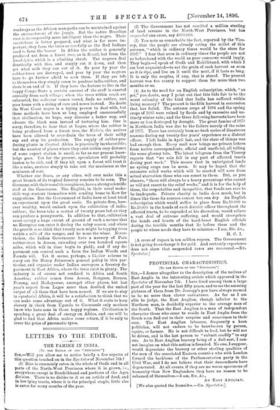LETTERS TO THE EDITOR.
THE FAMINE IN INDIA.
[To THZ EDTTOR OF THE " SPECTITOD-"] you allow me to notice briefly a few aspects of this question touched on in the Spectator of November 7th ?
(1) Rice is commonly eaten in the whole of Oudh and in all parts of the North-West Provinces where it is grown, i.e., everywhere except in Bundelkhand and portions of the Agra division. There is no dislike to it as an article of food, and in low-lying tracts, where it is the principal staple, little else is eaten for many months of the year. (2) The Government has not remitted a million sterling of land revenue in the North-West Provinces, but has suFpended one crore, say £600,000.
(3) You note as remarkable the fact, reported by the Vice- roy, that the people are already eating the millet of this autumn, "which in ordinary times would be the store for 1897." I fear that even in ordinary times the people are not so beforehand with the world as your comment would imply. They begin—I speak of Oudh and Rohilkband, with which I am best acquainted—to eat the grain of each harvest as soon as it is ripe, and live on it until the next, if it lasts so long. It is only the surplus, if any, that is stored. The present harvest was too scanty to support them for more than two months or so.
(4) As to the need for an English subscription, which, "as yet," you doubt, may I point out that this bids fair to be the worst calamity of the kind that India has suffered within living memory P The present is the fifth harvest in succession that has failed. The autumn crops of 1894 and the spring crops of 1895 were ruined by floods and by excessive and un- timely winter rain ; and the three following harvests have been. more or less destroyed by drought. The great famine of 1878 in Northern India was due to the failure merely of the rains of 1877. There has certainly been no buch series of disastrous seasons during my twenty-five years' experience as a district officer. I left India in April last, and the state of things was enough then. Every mail now brings me private letters. from native correspondents, official and unofficial, all telling the same gloomy tale. The latest telegram from the Viceroy reports that "no rain fell in any part of affected tracts during past week." This means that in unirrigated lands no spring crops can be sown. It may be hoped that the extensive relief works which will be started will save from actual starvation those who can resort to them. Bat, as you observe, "there will always be a heavy percentage who cannot or will not resort to the relief works," and it is for the help of these, the respectables and incapables, that funds are sure to be inadequate. Private charity in India does much, but in times like these its sources cannot but run dry. An English, subscription which would suffice to place from Rs.10,000 to Rs.20,000 in the hands of each district officer throughout the affected tracts, to be expended at his discretion, would relieve a vast deal of extreme suffering, and would strengthen the hands and hearts of the hard-beset English officials. during the terrible months that lie before them and the people to whose needs they have to minister.—I am, Sir, &c.,
H. 0.1.
[A crore of rupees is ten million rupees. The Government is not going to exchange it for gold. And certainly experience does nob show that suspended taxes are recovered.—ED. Spectator.]






































 Previous page
Previous page